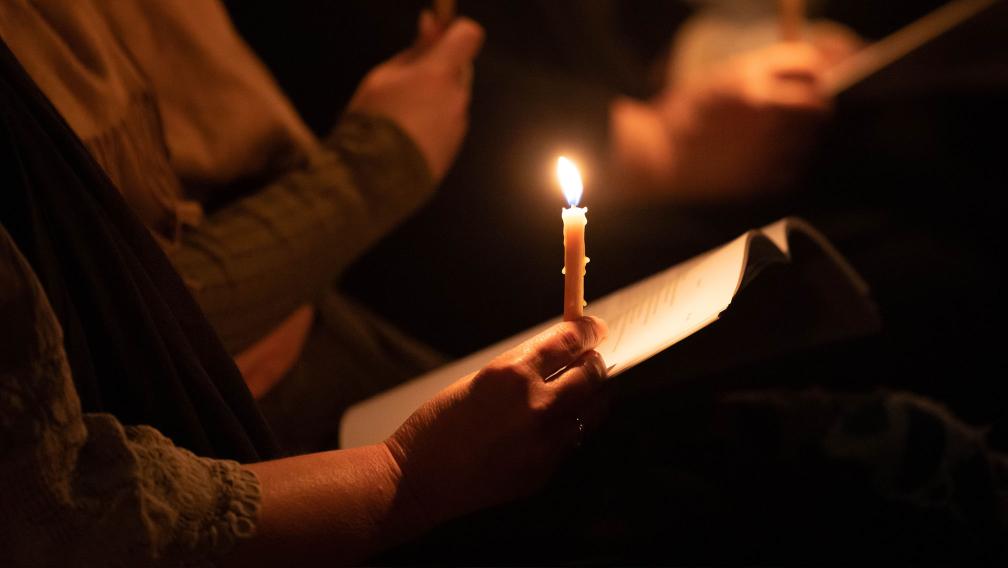Jesus said, “Then the kingdom of heaven will be like this. Ten bridesmaids took their lamps and went to meet the bridegroom. Five of them were foolish, and five were wise. When the foolish took their lamps, they took no oil with them; but the wise took flasks of oil with their lamps. As the bridegroom was delayed, all of them became drowsy and slept. But at midnight there was a shout, ‘Look! Here is the bridegroom! Come out to meet him.’ Then all those bridesmaids got up and trimmed their lamps. The foolish said to the wise, ‘Give us some of your oil, for our lamps are going out.’ But the wise replied, ‘No! there will not be enough for you and for us; you had better go to the dealers and buy some for yourselves.’ And while they went to buy it, the bridegroom came, and those who were ready went with him into the wedding banquet; and the door was shut. Later the other bridesmaids came also, saying, ‘Lord, lord, open to us.’ But he replied, ‘Truly I tell you, I do not know you.’ Keep awake therefore, for you know neither the day nor the hour.”
Matthew 25:1–13
Jesus’s parable sounds cryptic to modern ears. Who is this mysterious bridegroom, and why are there ten bridesmaids waiting for him? If, as most scholars agree, Jesus is speaking here of the coming Kingdom of God — when he will return to “judge the living and the dead” — why is the verdict so harsh? Must the five “foolish” bridesmaids be kept out of God’s kingdom for forgetting some oil?
Context, as usual, is key. Jesus’s story follows a series of vignettes about the power of watchfulness — the notion that one must live one’s life at the center of a paradox beating at the heart of Christianity. This paradox affirms, despite evidence to the contrary (the wars, conflicts, and uncertainties in our world), that everlasting life and communion with God is coming. There will be a time when all is resolved by God’s promises, when both God’s justice and mercy reign. The time for the fulfillment of this promise is hidden and yet also inaugurated in the incarnation of Christ. He is the bridegroom who comes with celebratory news to the poor — joy to the downtrodden, relief for the suffering in spirit.
We, then, who wait for this reality are tasked with a generative stillness — a way of being that keeps us busy with God’s work in the here and now while remaining in prayerful hope for the world to come. Or, as theologian W. Fiona Chen writes, “Optimism and hope are two different things. While the former implies passive longing, the latter requires active participation. I have begun to realize that hope is not merely a warm and fuzzy feeling I hang on to when I myself am in deep desolation. It is a Christian obligation, just as love is.”
Jesus’s parable reminds us we are not to be overwhelmed by bad news but to stay in communion with God, to keep the lamplight of our faith burning in trust and in hope. It is not that Jesus expects us to be perfect or naïve, ever vigilant in each waking second, nor burying our heads in the sand. Rather, he exhorts us to burn the midnight oil of our hearts.
The wedding banquet, which symbolizes God’s eternal kingdom, is both near and far — here and not yet. Still, in this time of waiting, we are called to be God’s hands and feet to those in need. Called to be peacemakers in times of conflict. Called to be the light of the world.
—Summerlee Staten
Music
Legendary folk singer and civil rights activist Odetta performs “This Little Light of Mine.”
Poetry
In “Autobiographical Fragment,” poet Katie Peterson sees the light under the bushel from another perspective.
Theology
Theologian W. Fiona Chen considers good and evil, freedom, and the holy obligation to hope: “Such a humbling thought is crystalized when we come to the realization that no one is in the position to deny anyone the infinite love and mercy of God.”
Visual Art
Jorge Cocco Santángelo’s painting The Ten Virgins beautifully captures the waiting bridesmaids in this week’s parable.
Social Justice
Professors of theology D. Brent Laytham and Michelle Clifton-Soderstrom remind us the parable of the ten virgins is not about individualism and meritocracy: “The oil in this story is akin to … the oil with which we anoint one another, preparing one another for our priestly call. This oil is a gift, given to each, and represents the abundant promises of God.”
Get the Five Ways In Your Inbox
Sign up to receive reflections and updates from the Faith Formation & Education team.
